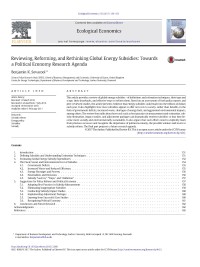Reviewing, Reforming, and Rethinking Global Energy Subsidies: Towards a Political Economy Research Agenda

This article provides a review of global energy subsidies—of definitions and estimation techniques, their type and scope, their drawbacks, and effective ways to reform them. Based on an assessment of both policy reports and peer-reviewed studies, this article presents evidence that energy subsidies could reach into the trillions of dollars each year. It also highlights how most subsidies appear to offer net costs to society, rather than benefits, in the form of government deficits, increased waste, shortages of energy fuels, and aggravated environmental impacts, among others. The review then talks about how tools such as best practices in measurement and estimation, subsidy elimination, impact studies, and adjustment packages can dramatically reorient subsidies so that they become more socially and environmentally sustainable. It also argues that such efforts need to explicitly learn from previous successes and recognize the importance of political economy, the possible winners and losers to subsidy reform. The final part proposes a future research agenda.
Sovacool, BK. “Reviewing, Reforming, and Rethinking Global Energy Subsidies: Towards a Political Economy Research Agenda, Ecological Economics 135 (May, 2017), pp. 150-163.
http://dx.doi.org/10.1016/j.ecolecon.2016.12.009

